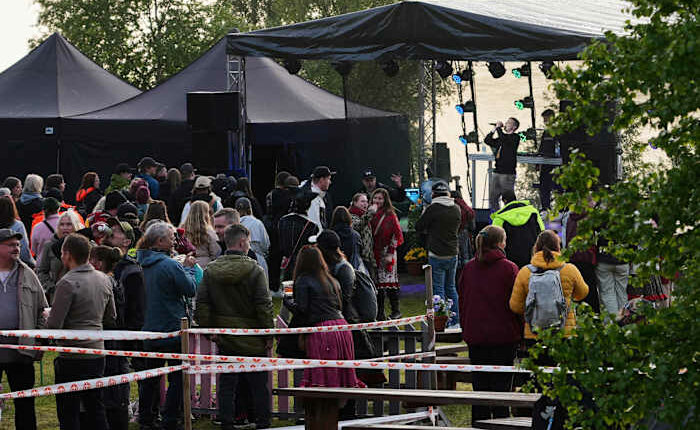Share this @internewscast.com

UTSJOKI – Mihkku Laiti took to the stage at an open-air music festival in the village of Utsjoki, deep in Finland’s northern region past the Arctic Circle, well after midnight.
Even though it was late, the renowned midnight sun of Lapland illuminated the scene. In Utsjoki, located just under 50 kilometers (30 miles) from the Arctic Ocean, the sun does not set during the summer months.
Amidst the soft glow of blue spotlights, Laiti performed his rap while a crowd exceeding 300 enjoyed the show, with some joining in by singing and dancing. Laiti, like most Utsjoki locals, is part of the Sámi community — the only officially recognized Indigenous group in Europe — and he delivered his performance in his native Sámi tongue.
Laiti, also known by his stage name “Yungmiqu,” is the founder of the Loktafeasta rap festival. He first found fame on the television show Talent Finland, where he surprised the judges by rapping in the gákti, the traditional dress of the Sámi. It is brightly colored and often characterized by plaits, pewter embroidery and a high collar.
The festival brought Laiti’s Indigenous culture to the spotlight, though some of his fans could not understand what he was saying. That didn’t seem to bother anyone at the Loktafeasta as the festival mixed performances from artists in both Sámi language and Finnish.
Some drank beer and ate sausages and the crowd seemed to enjoy the summer festival atmosphere despite spells of rain.
“When I rap about my culture … I want to show how being Sámi is like from my point of view,” Laiti told The Associated Press.
“Because there are many stereotypes about Sámi people and I want to like normalize … the basic stuff we do and not romanticize those things,” he said. He added that he has not worn the gákti for performances for about a year now to show people that it is possible to be Sámi and wear whatever you want.
Europe’s only recognized indigenous people
The Sámi traditionally live in Lapland, which stretches from northern parts of Norway to Sweden and Finland to Russia. However, of the roughly 10,000 Sámi people living in Finland, the majority now live outside their homeland.
The Sámi people were oppressed for centuries by the powers that ruled and exploited their lands, including bans of the use of their native tongues and efforts to suppress their culture. In the past decades, there have been efforts to reestablish their rights, including the right to use Sámi languages which is now guaranteed in the Finnish constitution.
Today, the historically semi-nomadic Sámi people have modern lifestyles. The few who still tend reindeer do so with modern vehicles, digital tools and regulated land use.
However, there is an effort to preserve the Sámi’s cultural identity. Distinctive Sámi clothing was worn by many at Loktafeasta, as is typical on special occasions.
Artists rap in Finnish and Sámi language
At the festival, Laiti mostly wanted his fans to be happy and enjoy the music.
“I want people to feel joy, of course, and I just want people to be happy that we have this kind of festival here in Utsjoki,” he said with a smile.
Among the other acts was a duo comprised of self-confessed old school tango crooner Jaakko Laitinen and rapper Jouni J. They also reside in Lapland and perform in Finnish.
“I see a connection from the hip hop and the tinkering with words to the old Finnish like Kalevala freestyling folk poetry,” said Laitinen, referring to Finland’s national epic about the Earth’s creation.
“So that obvious connection and the Finnish tango … is part of our soul and heart,” he added.
A world away from the birthplace of rap music in the Bronx
Although the duo’s songs were a world away from the birthplace of rap music in the Bronx in New York City, their performance brought joy to Utsjoki’s locals and visitors.
“Music travels and music brings people together. It’s the magic of the international language of music,” Laitinen said.
Copyright 2025 The Associated Press. All rights reserved. This material may not be published, broadcast, rewritten or redistributed without permission.










